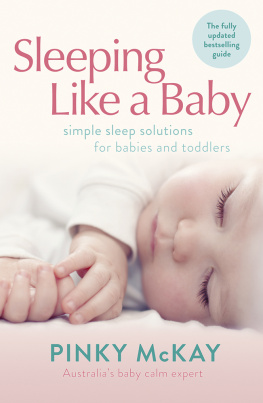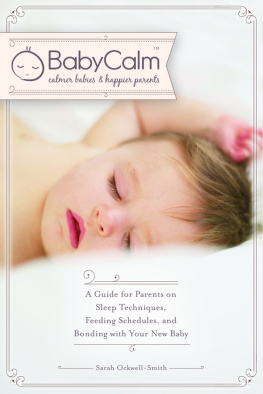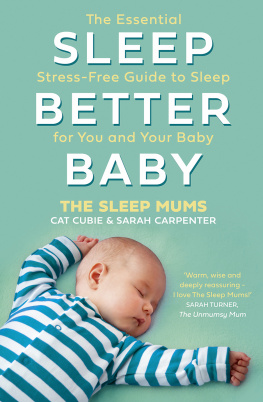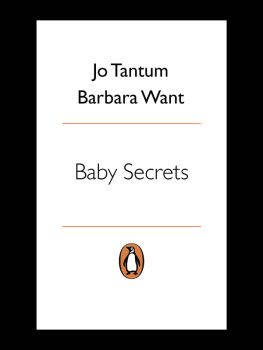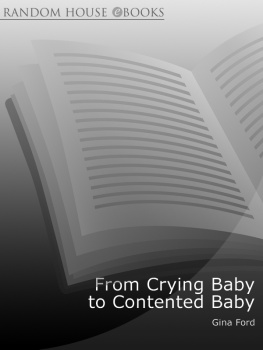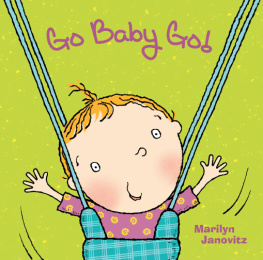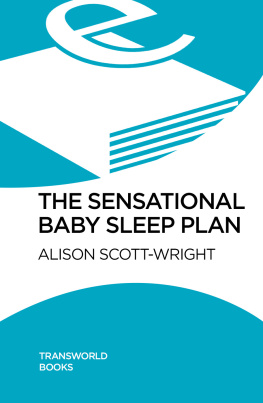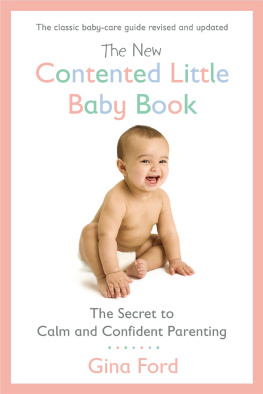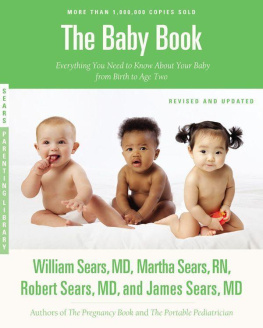PARENTING BY HEART
A n International Board Certified Lactation Consultant (IBCLC), certified infant massage instructor and sought-after keynote speaker at conferences for parents and health professionals internationally, Pinky McKay is the author of Toddler Tactics, Sleeping Like a Baby and 100 Ways to Calm the Crying. She runs a busy private practice in Melbourne and, thanks to modern technology, also supports clients around the world with gentle baby care, breastfeeding, settling and sleep solutions through her e-newsletter, web site, blog, teleseminars, workshops and private consultations.
The mother of four adult children and a now-teenage bonus baby, Pinkys greatest pleasure is enjoying the precious giggles and cuddles of her delightful grandchildren. Visit her web site at www.pinkymckay.com.
By the same author
Sleeping Like a Baby
100 Ways to Calm the Crying
Toddler Tactics
PARENTING BY HEART
Sleeping, feeding and gentle care for your babys first year

PINKYMcKAY
VIKING
an imprint of
PENGUIN BOOKS
Trust yourself. Trust your child. Trust your feelings.

To my own five babies, who taught me so much about surrender, trust and unconditional love. And to my grandbabies, who really are natures reward for nurturing our young, and a reminder that:
Time which passes swiftly by
wont stop to hear us, though we cry
for days long gone and smiles missed,
For damp curls that we should have kissed.
Introduction

E very parent, every child and every parentchild relationship is unique. Parenting by Heart is not about advocating a single parenting method because there is no one-size-fits-all. Rather, the spirit of this book is about encouraging you to trust not only your innate wisdom but also your childs response to your nurturing, just as women have throughout time, in cultures all over the world. Sadly, our confidence in our ability to nurture our young has gradually been undermined to the point that few women in our own time and culture seem to trust their intuition or their childs responses.
Each day, in my work as a lactation consultant and baby massage instructor, I hear from parents (mostly mothers) who feel confused, frustrated and overwhelmed by immense pressure to live up to unrealistic expectations. Many are burdened by feelings of inadequacy and guilt because they dont have a good baby (who is, they believe, a reflection of their own competence). Mothers express fears that if they do hold and cuddle their babies as their instincts are urging, they may encourage bad habits.
In our culture, values such as independence and control are prized. The pressure to be seen as coping (or in control) perpetuates the myth of the good baby. Many parents are afraid to speak openly about how their babies behave: those whose infants dont simply feed, play and sleep (preferably in that order) often feel as though they are somehow abnormal if they give in to their babys cries; mothers whose babies fail sleep training fear that they too have failed, as they secretly soothe little night howls; and many mothers exist in isolation because they are afraid of the stares and advice they will attract if they venture out in public with a baby who happens to cry as all babies tend to do, at times!
I was terrified of going out, and didnt really get over this for four months. I couldnt handle the feeling that my skills (or, more to the point lack of) as a mother were on display for the world to see.
Rachelle, mother of a nine-month-old
There is also pressure on the other side of the pendulum. The mother who confesses that she is having a difficult time and perhaps has responded to her child harshly, or not as she may have if shed had more help, is likely to be criticised too. Then there is the mother who is making conscious choices about her parenting but not fitting into the rigid ideas of a fundamentalist parenting group. Sometimes, mothers themselves create the worst kind of pressure.
I popped my baby into her pram and walked to a nearby attachment parenting group I needed to meet some other mums with small babies. I was breastfeeding and had had a natural birth at a birth centre, so I expected to meet some kindreds at such a group. Instead, I was criticised for having my baby separated from me in a pram, and also because she had a dummy. I went home feeling shattered and like a failure.
Lexie, mother of a three-month-old
For many parents in our culture, having a baby is an enormous shock, rather than a rich experience in the continuum of life, celebrated and supported by the community. Many women today have never held a baby before their own is thrust into their arms. Invariably, as new mothers struggle with the notion of the good baby, they are also struggling with an identity crisis who am I now? Even when she looks in the mirror, the face (and body) reflected back at the new mother is virtually unrecognisable in comparison to the smart, savvy woman who used to have a clearly defined job description and a life that would fit neatly into her electronic organiser.
I think it was the fact that I had always been so independent and successful that made it so much harder for me to surrender to these feelings of vulnerability. I was a health professional I felt I should have known what to do. I felt that everyone was watching me testing me, waiting for me to slip up. Even amongst my girlfriends with babies, it felt like we were all competing as to who was the perfect mum with the perfect baby.
Melissa, mother of a toddler
Fathers can of course also experience shock at the new responsibilities and changed lifestyle involved with parenthood.
People would say, You must be so happy. Part of me was thinking: I should be happy, I am a father. But our lives had changed so dramatically that we were tired and stressed for weeks and months. There was a lot to get used to, especially the changes in our relationship. I would wonder: Does this mean there is anything wrong with me, or with me as a father?
Richard, father of a one-year-old
When our sense of self is eroded, it is extremely difficult to trust our feelings or to believe we possess any wisdom at all. It is easy, then, to see how uncertainty and doubt creep in, and how new parents, desperate to regain a sense of control over their lives, not to mention their partner relationships, are all too willing to grasp at whatever promises are being made by whoever is offering advice. And, no matter how unrealistic these promises, or whatever the trade-offs involved, the promise of a good that is, convenient baby is almost irresistible, even when it is being made by men in suits, in offices or clinics, or by childless celebu-nannies who have never experienced the profound effects of the hormonal chemistry between a mother and her own infant. Without this amazing biological connection, it is almost impossible to fathom the awesome responsibility that you feel as you gaze into the eyes of your trusting baby, knowing that you are everything to her and that everything she needs comes from you.
Babies magically draw people together, even before they are born. It seems that everybody loves to share in the delight that a baby brings. Suddenly, too, it seems as though everyone is an expert about your child. You can put yourself in the hands of these experts or you can put yourself in charge. This doesnt mean you have to ignore or dismiss advice after all, most of it is given with good intent. Nor do you have to go it alone without seeking support or professional help. Taking charge is about trusting yourself and your connection with your child, but it is also about becoming informed by asking questions, reading and listening so that you can make the most appropriate choices for your situation.
Next page

